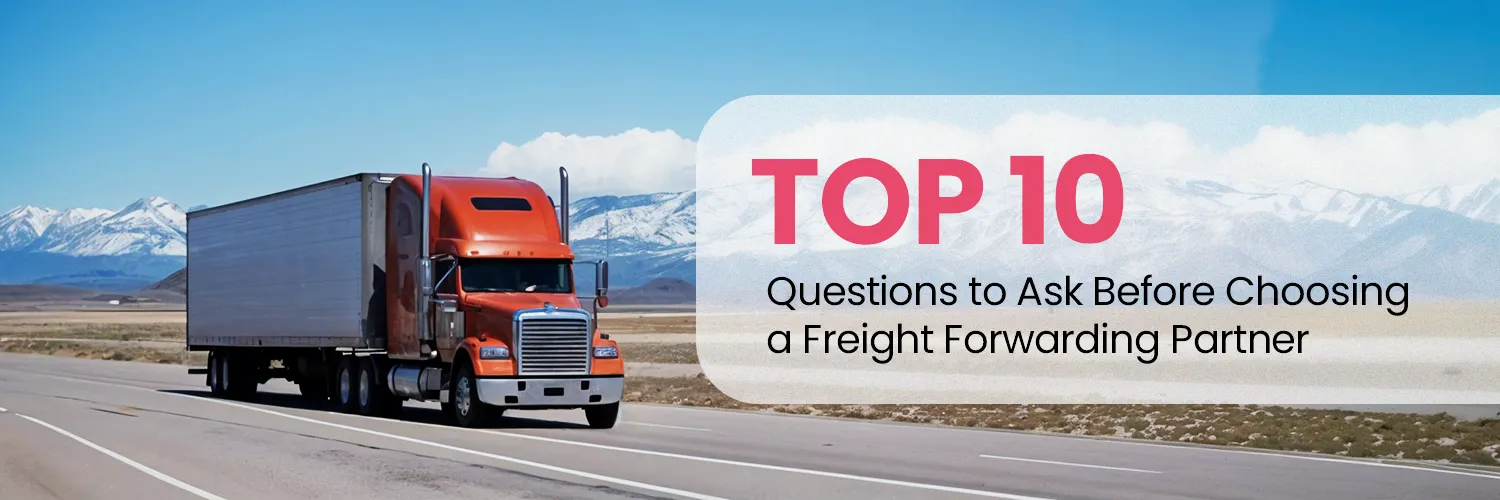Top 10 Questions to Ask Before Choosing a Freight Forwarding Partner
Global trade is growing rapidly, and businesses depend heavily on reliable freight solutions to keep their supply chains moving. Without the right freight forwarding partner, even the most efficient operations can face delays, compliance issues, and higher costs. To make a confident choice, companies must ask practical questions that reveal whether a logistics provider can meet their shipping needs.
Let’s discuss these essential questions in detail:
1. What Experience Do They Have in Your Industry?
Not every logistics provider understands the unique needs of different sectors. For instance, a company exporting fresh food requires strict temperature control, while heavy machinery demands specialized handling. An experienced freight forwarding partner brings knowledge of these industry-specific requirements. This reduces risks, prevents delays, and ensures compliance with regulations. Asking about past projects or case studies helps you assess whether they have handled similar shipments successfully.
2. Which Trade Routes and Regions Do They Specialize In?
Shipping routes are not the same worldwide. Some freight forwarders focus on Asia-Pacific while others have strong networks in the Middle East, Europe, or North America. If your company frequently ships to a certain region, you need a forwarder with expertise in those trade lanes. Their relationships with carriers and familiarity with regional rules can significantly speed up customs clearance and reduce transit times.
3. Do They Provide End-to-End Supply Chain Management Solutions?
A forwarder that offers more than port-to-port services adds extra value. Many businesses now expect complete supply chain management solutions, including warehousing, distribution, inland trucking, and customs clearance. Having one reliable shipping company manage all aspects means fewer middlemen, better coordination, and reduced errors. This integrated approach helps you save time and gain greater visibility over your shipments.
4. What Certifications and Licenses Do They Hold?
Trust in freight forwarding is built on compliance. Certifications like FIATA or IATA, along with local customs approvals, show that the company operates under international standards. These licenses are not just paperwork; they indicate credibility and adherence to industry best practices. Working with uncertified companies can lead to customs delays and penalties, something businesses cannot afford in competitive markets.
5. How Strong Are Their Global Partnerships?
A freight forwarder is only as strong as their global network. If they have strong agents, alliances, and partnerships in key markets, you can expect smoother shipping experiences. For example, the best freight forwarder in Karachi will often have established ties with international carriers, overseas agents, and port authorities. These relationships ensure quick problem resolution, timely updates, and reliable delivery across borders.
6. What Technology Do They Use for Tracking and Communication?
Technology is a critical factor in logistics company selection. Businesses now expect real-time tracking, digital documentation, and transparent communication. A forwarder offering an online portal or app for shipment updates keeps you informed without the constant back-and-forth emails. According to research, digitization could save the shipping industry up to $70 billion annually by 2030. This highlights the growing role of tech in efficiency and customer satisfaction.
7. How Transparent Are Their Costs and Pricing Models?
Freight rates are often complex, with base charges, surcharges, and hidden costs. A trustworthy forwarder provides clear quotations with all charges included. Transparency in pricing builds confidence and prevents surprises when invoices arrive. Compare quotes not only on the basis of cost but also on the services included, since the cheapest option might lack crucial support like customs handling or insurance.
8. How Do They Handle Customs and Regulatory Compliance?
A forwarder with a skilled customs brokerage team can save your business from costly mistakes. Every country has its own rules for imports and exports. Incomplete paperwork or errors in tariff codes can lead to significant delays. Partnering with a forwarder who handles compliance efficiently helps ensure your goods move smoothly across borders.
9. What Support Do They Offer During Emergencies or Disruptions?
Global shipping is unpredictable. Strikes, port congestion, weather events, and even pandemics can disrupt schedules. A reliable shipping company has contingency plans and crisis management strategies in place. They should be able to re-route shipments, find alternative carriers, and keep you informed throughout the disruption. For example, during the COVID-19 crisis, many businesses were searching for companies that have expertise in emergency management. Compared to traditional shipping companies, they offered services with fewer disruptions.
10. Can They Scale With Your Business Growth?
A freight forwarder should not just solve your present problems but also grow with your company. As your shipment volumes increase, can they handle larger loads or expand services into new markets? Scalability is a vital factor, especially for companies eyeing international expansion. A long-term freight forwarding partner will align with your strategic goals and support your business through different growth stages.
Conclusion
Selecting the right logistics provider goes beyond comparing rates. The process of logistics company selection must include evaluating experience, technology, compliance expertise, and global reach. Asking the right questions gives you the clarity to make smarter choices. Businesses that take time in carefully choosing a freight forwarder avoid risks, save costs, and enjoy smoother trade operations.
Choosing the right partner can be challenging, but this is where DWWLG makes a difference. With expertise in ocean consolidation, air freight, customs brokerage, and end-to-end supply chain management solutions, DWWLG offers reliability that businesses can count on. As one of the best freight forwarders in Karachi, the company combines local insight with a strong international network, ensuring that your shipments are handled with precision from origin to destination.
FAQs
Q1: Why is experience important when selecting a freight forwarder?
Experience ensures that the forwarder understands specific industry requirements, compliance rules, and potential risks. It reduces errors and guarantees smoother operations.
Q2: What documents are usually required for international shipping services?
Common documents include the bill of lading, commercial invoice, packing list, and certificates of origin. Depending on the product, additional permits may also be required.
Q3: How do I know if I’m working with a reliable shipping company?
Check certifications, client testimonials, and their ability to provide transparent costs and tracking. A reliable company will also have strong global partnerships.
Q4: Is choosing a local forwarder better than a global one?
A local forwarder offers regional expertise, while a global forwarder provides broader networks. The ideal choice depends on your company’s specific trade routes and growth plans.



















